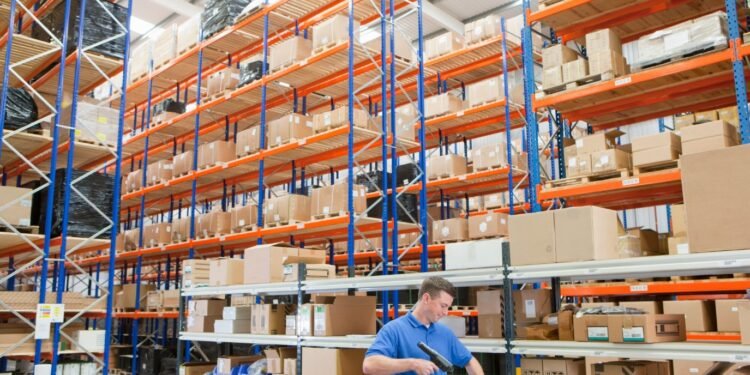In today’s busy world, warehouses are like the beating hearts of stores and businesses, helping get products where they need to go. The people who work as warehouse material handler plays an important role in this process.
They help make sure items are moved, stored, and kept safe so that businesses can run smoothly. If you ever wonder how a store keeps shelves stocked or why online orders arrive on time, a lot of it is thanks to these hardworking individuals.
What Does a Warehouse Material Handler Do?
A warehouse material handler is someone who works in a warehouse moving products around. Their job includes lifting, carrying, and organizing items so they can be easily found and sent out when needed.
They are the ones who load and unload goods, keep track of warehouse inventory management, and make sure products are stored correctly so nothing gets damaged. This job may sound simple, but it takes practice and many skills to do it well.
In fact, this type of work is growing in demand. More and more people will be needed for these jobs in the coming years. As warehouses continue to grow, it becomes even more important for warehouse handlers to be good at what they do.
Equipment Operation
One of the most important parts of this job is learning how to safely operate different types of warehouse equipment. A warehouse has tools that help move heavy items such as:
- forklifts
- pallet jacks
- hand trucks
- conveyor belts.
Proper training and certifications are often required to operate this equipment. Those looking to hire equipment for warehouse use should consider visiting services like forklift hire Sydney to ensure they have access to the right machinery.
Organizational Skills
Organization is key in a warehouse. Warehouse material handlers need to know where everything is, so they can quickly find items that need to be shipped out. They keep track of inventory, which means they regularly count items and make sure they are where they belong.
If an item is out of place or something goes missing, it could create problems, like delays in sending orders or too much stock building up.
Moreover, strong organizational skills extend beyond inventory management to the equipment that supports daily warehouse operations. For instance, many facilities rely on Indianapolis Forklift Rentals (or one elsewhere) to handle heavy loads and streamline material movement. Therefore, keeping track of this equipment, scheduling its use efficiently, and ensuring it is properly maintained are just as important as managing stock. By applying the same level of organization to both inventory and equipment, warehouse staff can improve overall productivity and prevent costly downtime.
Attention to Details
Paying attention to details is very important for a material handler. They need to follow directions closely, check the weight of items, and inspect everything for damage. Even a small mistake could lead to problems, like an accident or a mix-up in inventory.
For example, if a handler accidentally damages a box without realizing it, the items inside could get ruined, which would cause delays. By carefully checking items and paying attention to details, warehouse handlers can prevent these issues and keep everything running smoothly.
Physical Strength and Stamina
Warehouse worker duties can be physically demanding. A material handler needs to be strong and able to lift heavy objects, often spending hours walking or standing. Since lifting and carrying items is part of the daily routine, handlers need to be fit and have good stamina, or endurance.
To stay in shape for the job, many handlers work on their fitness, and they learn safe lifting techniques to avoid injuries. This helps them to work longer hours without getting tired quickly or hurting themselves.
Teamwork and Communication Skills
Warehouse material handlers don’t work alone. They are part of a team and often need to work with other people, like their managers and coworkers. Good communication helps everyone work together efficiently and safely.
For instance, if a handler spots a problem, like an item blocking an aisle, they need to let others know so it can be fixed. Teamwork helps everyone stay safe, share tasks, and get things done faster.
Problem-Solving Abilities
Sometimes, things don’t go as planned in a warehouse, and that’s when problem-solving becomes important. Warehouse material handlers often face unexpected challenges, like running low on certain materials, dealing with broken equipment, or finding ways to solve delivery problems.
Being able to think quickly and come up with solutions helps handlers keep things moving without causing delays. This problem-solving skill is valuable because it helps the entire team stay productive.
Safety Awareness and Compliance
Safety is a top priority in any warehouse. Handlers must follow certain rules and guidelines to keep themselves and others safe. For example, they learn about OSHA (Occupational Safety and Health Administration) rules, which are guidelines designed to protect workers from accidents and injuries.
Knowing how to safely handle hazardous materials and what to do in emergencies is also part of the job. Regular training in warehouse safety protocols helps handlers stay updated, reducing the chance of accidents and creating a safer environment for everyone.
Basic Computer Skills
In today’s world, even warehouse work often requires some computer skills. A material handler may need to use software to keep track of inventory, enter data, or check on orders.
Knowing how to use a computer, even just the basics, helps handlers work faster and keeps things organized. It also allows them to quickly update information about items and keep records accurate.
The Importance of Continuous Learning
As technology and processes in warehouses change, it’s important for material handlers to keep learning. By staying updated with the latest tools, equipment, and techniques, they can become more efficient and useful to their team. Whether through formal training, workshops, or online courses, continuous learning helps them improve their skills and get better at their jobs.
Creating a Safe and Efficient Workplace
By mastering these skills, warehouse material handlers can make a big difference in how smoothly and safely a warehouse operates. Companies that invest in training their handlers, ensuring they know safety rules, and providing tools for learning new skills, often see better results in their operations. These skills also make the work environment more productive, as handlers can work more effectively and help prevent accidents.
Summing It Up
Being a warehouse material handler takes a lot of skills, from knowing how to use equipment to be a good communicator. By focusing on these areas, material handlers can improve their abilities and make a positive impact on their workplace.
Not only does this help them do their job better, but it also helps the whole team work together smoothly. For anyone in this role, learning new skills and keeping up with changes in the industry is a great way to succeed and grow in their career.
Visit our website and read more.












